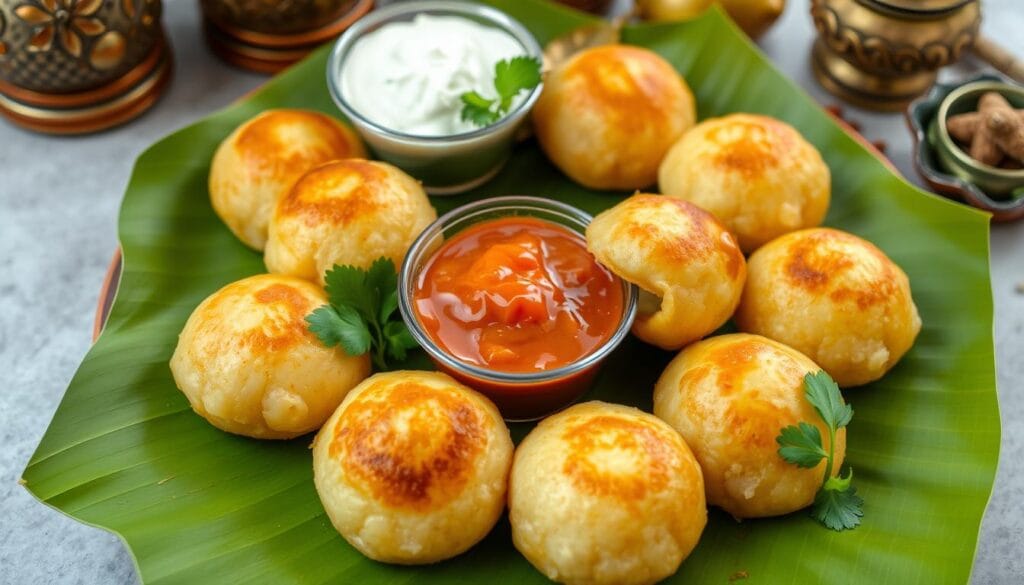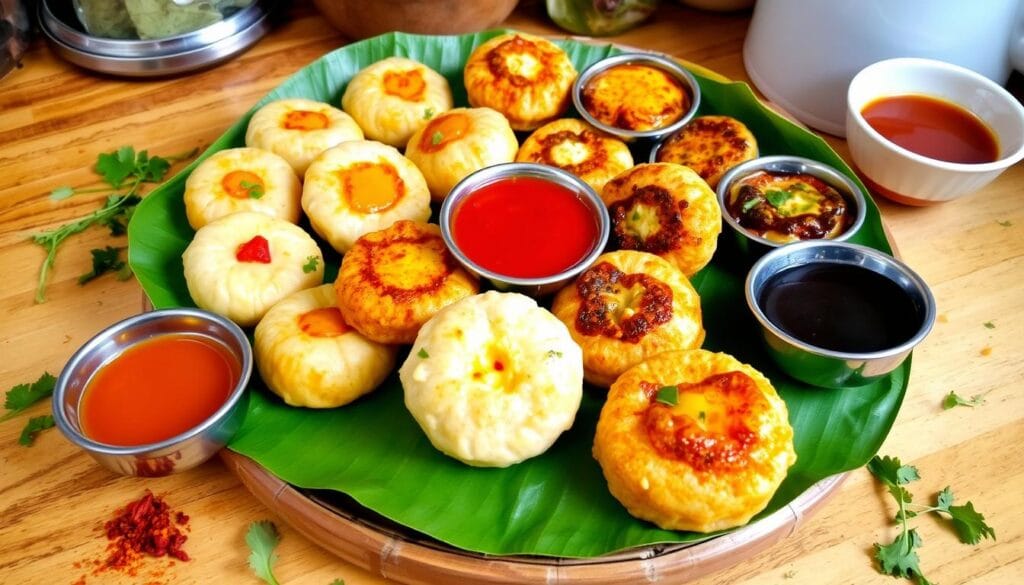Table of Contents
Kuzhi paniyaram, also known as paddu or appe, is a beloved South Indian breakfast and snack. It comes from Tamil Nadu cuisine. This dish is made from fermented rice and black gram (urad dal).
The special paniyaram pan gives kuzhi paniyaram its unique texture and taste. It’s a tasty street food that’s also good for you.
How to Make Kuzhi Paniyaram
To make kuzhi paniyaram, you soak and grind the fermented rice batter. Then, you let it ferment to boost its flavor and nutrition. Next, you fill the paniyaram pan’s molds with the batter.
Finally, frying the batter in oil or ghee makes it crispy on the outside and soft inside. This is how you get the signature kuzhi paniyaram.
If you love South Indian cuisine or want to try kuzhi paniyaram, this recipe is for you. It’s easy to follow and will let you make this tasty vegetarian snack at home. Get ready to enjoy the amazing aroma, texture, and taste of this gundu paniyaram.
What is Kuzhi Paniyaram?
Kuzhi paniyaram, also known as paddu or appe, is a beloved South Indian dish. It comes from the Chettinad region of Tamil Nadu. This dish is made from a fermented batter of rice and black gram (urad dal).
It’s cooked in a special pan, making small, crispy dumplings. These dumplings have a soft, fluffy inside.
A Traditional South Indian Fermented Rice and Lentil Dumpling
The fermentation process makes kuzhi paniyaram special. It’s a favorite in Tamil Nadu cuisine for breakfast and snacks. It’s often served with chutneys, sambar, or pickles.
This makes for a tasty meal. You can add onions, coriander leaves, and green chilies to the batter. This way, you can make both sweet and savory versions.
| Kuzhi Paniyaram Facts | Statistics |
|---|---|
| Origin | Thanjavur district of Tamil Nadu |
| Flavor Variations | Sweet (jaggery or coconut) or Savory (green chilies, ginger, onions) |
| Popularity | Popular street food and restaurant item in India |
| Batter Ingredients | Rice flour, fermented rice and lentil batter |
| Calorie Content | 80-100 calories per paniyaram cake |
| Serving Suggestions | Breakfast, snack, or light meal with chutney or sambar |
| Batter Preparation | Fermented overnight before cooking in a specialized pan |
| Nutritional Benefits | Good source of protein and fiber from rice and lentils |
“Kuzhi paniyaram is a delightful and versatile South Indian dish. It has been a part of Tamil Nadu’s culinary heritage for generations. The fermented batter and unique cooking method result in a truly irresistible snack or breakfast option.”
Ingredients for Kuzhi Paniyaram Batter
Making the perfect kuzhi paniyaram batter is key to this South Indian favorite. You’ll need raw rice, whole urad dal (black gram), and fenugreek seeds. These simple ingredients mix to create a tasty, fermented batter.
Start by soaking the rice and urad dal for at least 2 hours. This makes them soft and releases starches, important for the right batter. Fenugreek seeds add a special aroma and help with fermentation, giving the batter a tangy taste.
Grind the soaked rice and dal into a smooth, semi-thick batter. Let it ferment for 10-12 hours. This step is vital for the batter’s flavor and texture.
To make the batter even better, add salt, chopped onions, green chilies, and curry leaves. These ingredients enhance the batter’s taste, adding depth and complexity.
With the right ingredients and fermentation, you’re ready to make delicious, crispy kuzhi paniyaram. It will take you straight to the heart of South Indian cuisine.
Preparing the Kuzhi Paniyaram Batter
To make the perfect kuzhi paniyaram batter, start by soaking raw rice and whole urad dal together. Let them soak for 4-6 hours, or even overnight. This softens the grains and makes grinding easier.
After soaking, drain the excess water and grind the rice and lentils into a smooth batter. Use a blender or grinder for this.
Next, transfer the batter to a large container. Add salt and let it ferment for at least 8 hours or overnight. This step is key for the batter’s flavor and fluffy texture.
Fermentation is a traditional south Indian cooking method. It unlocks the batter’s full potential.
Here’s a quick breakdown of the key steps in preparing the kuzhi paniyaram batter:
- Soak 1.5 cups of raw rice and 0.5 cups of whole urad dal for 4-6 hours or overnight.
- Drain the soaked grains and grind them into a smooth batter.
- Transfer the batter to a large container, add a pinch of salt, and let it ferment for at least 8-10 hours.
- Optionally, you can also add 0.25 cups of Poha/Beaten Rice to the batter for extra texture.
- Incorporate around 8-10 curry leaves to infuse the batter with aromatic flavor.
The fermented batter should have a dosa-like pouring consistency. This makes it perfect for shaping and cooking the delightful kuzhi paniyaram. Remember, patience and attention to detail are key when preparing this traditional south Indian delicacy.
| Ingredient | Quantity |
|---|---|
| Raw rice | 1.5 cups |
| Whole urad dal | 0.5 cups |
| Poha/Beaten Rice | 0.25 cups |
| Curry leaves | 8-10 |
| Fermentation time | 8-10 hours |
By following these steps, you’ll be well on your way to creating a delectable and authentic kuzhi paniyaram batter. It’s perfect for frying up crispy, golden-brown paniyaram.
Tempering for Kuzhi Paniyaram
To elevate your kuzhi paniyaram, try adding a flavorful tempering. This aromatic mix boosts the taste and smell of the fermented batter. It makes every bite a delight.
Aromatic and Flavorful Additions
The tempering for kuzhi paniyaram involves cooking a few key ingredients in oil until they smell great. Start by heating 2 tsp of oil in a pan. Once the oil is hot, add 1 tsp of mustard seeds, 1 tsp of urad dal, and 1 ½ tsp of chana dal. Let the seeds crackle and the lentils turn golden.
Then, add ½ tsp of asafoetida, 4-6 curry leaves, 1 onion, finely chopped, 2 green chilies, finely chopped, and 1 ½ inches of ginger, grated. Cook until the onions are clear and the air is filled with scent.
Lastly, mix in a handful of chopped coriander leaves and stir quickly. This vibrant tempering is now ready to mix into the kuzhi paniyaram batter. It will make your crispy dumplings even more flavorful.
“The secret to delicious kuzhi paniyaram lies in the perfect balance of spices and aromatics in the tempering. It’s a game-changer for your taste buds!”
Cooking Kuzhi Paniyaram
To make the perfect kuzhi paniyaram, you need a special paniyaram pan or appe pan. This pan has small, round cavities for the batter to cook into dumplings. It can be cast iron, brass, bronze, or non-stick, each with its own benefits.
Before cooking, heat the paniyaram pan and grease the cavities with oil. Pour the batter into the cavities, filling them about three-quarters full. Cover the pan and cook until the paniyaram puff up and the bottoms are golden-brown.
Flip the paniyaram and cook the other side until it’s fully cooked. This frying technique is key to getting a crispy outside and a soft inside. It’s what makes kuzhi paniyaram so delicious.
| Cooking Vessel | Advantages |
|---|---|
| Cast Iron Paniyaram Pan | Excellent heat retention, durable construction, and natural non-stick properties |
| Brass or Bronze Paniyaram Pan | Distribute heat evenly, impart a unique metallic flavor, and add a touch of traditional charm |
| Non-Stick Paniyaram Pan | Easy release of paniyaram, convenient for quick cleanup, and suitable for health-conscious cooks |
“The key to perfectly cooked kuzhi paniyaram is in the preparation of the batter and the careful control of the cooking temperature and frying technique.”
Kuzhi Paniyaram: A Versatile Snack or Breakfast
Kuzhi paniyaram is a favorite in South Indian cuisine. It’s great as a snack or breakfast. These small dumplings are made from fermented rice and lentil batter. They have a unique taste and texture that’s comforting.
The batter mix is usually parboiled rice and urad dal in a 2:1 ratio. But, there are variations. The fermentation makes the paniyaram light and fluffy.
People often enjoy kuzhi paniyaram with tea and chutneys or sambar. It’s also a part of a big South Indian breakfast. Alongside idli, dosa, and vada, it’s a versatile and convenient choice for any time.
| Snack | Breakfast |
|---|---|
| Kuzhi paniyaram can be enjoyed as a crispy, bite-sized snack with chutneys or sambar for dipping. | Kuzhi paniyaram can be part of a larger South Indian breakfast spread, paired with other traditional dishes. |
Kuzhi paniyaram’s fermented batter and cooking method make it special. It’s a comforting food in South Indian cuisine. Whether as a quick snack or a hearty breakfast, it’s a versatile choice for any time.

“Kuzhi paniyaram is a versatile dish that can be enjoyed as a snack or a breakfast item in South Indian cuisine. The fermented batter and the unique cooking method give the paniyaram a distinct flavor and texture that make them a beloved and comforting food item in the region.”
Healthy and Nutritious
The Benefits of Fermentation
Kuzhi paniyaram is a healthier snack than many others because of its fermented batter. The fermentation makes nutrients like folate, iron, and zinc easier for our bodies to use. It also helps digest carbs and proteins in the batter.
Even though they are fried, you can use less oil. This makes them a balanced and nutritious snack or breakfast. They fit well into the traditional South Indian diet.
The fermentation in Kuzhi Paniyaram batter turns carbs and proteins into easier forms to digest. This makes it a better choice than some fried snacks. The fermented batter also boosts digestibility, adding nutrition to the South Indian diet.
| Nutrient | Increase in Bioavailability |
|---|---|
| Folate | Increased |
| Iron | Increased |
| Zinc | Increased |
“The fermentation process in Kuzhi Paniyaram helps to increase the bioavailability of important nutrients, making it a healthier choice compared to other fried snacks.”
Variations and Customizations
Kuzhi paniyaram is a versatile South Indian snack. It can be customized in many ways. The traditional recipe uses a rice and lentil batter. But, you can add your own twist to make it crispy and delicious.
Adding finely chopped vegetables to the batter can make your kuzhi paniyaram healthier. Carrots, beans, cabbage, and even spinach or siru keerai (tropical amaranth) can be used. They add flavor and essential vitamins and minerals.
Using leftover idli or dosa batter is a great way to make kuzhi paniyaram quickly. It saves time and ensures no batter is wasted. Some people even try using different flours like ragi or whole wheat for a unique taste.
For those who love spices, Masala Paniyaram is a must-try. It includes cumin, coriander, and chili peppers for a bold flavor. If you prefer something sweeter, try Sweet Paniyaram. It has a touch of jaggery or sugar for a caramelized taste.
Kuzhi paniyaram is a blank canvas for your creativity. You can make it savory, spicy, or sweet. It’s also a great way to add more vegetables to your diet. The possibilities are endless with this beloved South Indian snack.

Serving and Storing Kuzhi Paniyaram
Kuzhi paniyaram, the tasty South Indian rice and lentil dumplings, are best hot and fresh. They should be served right after cooking. This keeps their crispy outside and fluffy inside just right.
These dumplings go well with many chutneys and dips. Try the creamy coconut chutney, tangy tomato chutney, or the versatile sambar. These flavors match the paniyaram’s savory taste, making a great snack or breakfast.
If you have leftover kuzhi paniyaram, store them in an airtight container for a few days. To get their crisp back, reheat them in the paniyaram pan with a bit of oil. This trick makes them taste as fresh as when they were first made.
| Paniyaram Serving Suggestions | Paniyaram Storage and Reheating |
|---|---|
|
|
By following these tips, your homemade kuzhi paniyaram will stay tasty and enjoyable. Enjoy them as a snack or a hearty South Indian breakfast.
Conclusion
Kuzhi paniyaram is a favorite dish in South India. It’s made from a special batter of rice and lentils. This batter is fermented, giving the paniyaram a crispy outside and a soft inside.
The recipe is detailed. It involves soaking, grinding, and fermenting the batter. Then, a mix of spices and aromatics is added, making the dish unique.
Kuzhi paniyaram can be enjoyed alone or with chutneys and sides. They are a key part of South Indian cuisine. This dish is perfect for those who love traditional recipes and a crispy and fluffy texture.
However, kuzhi paniyaram has a lot of carbs. This might be a problem for those on a ketogenic diet. But, with some planning, you can still enjoy its flavors and textures.
So, try kuzhi paniyaram and experience the rich flavors of South India. It’s a delicious and versatile snack.
FAQ
What is kuzhi paniyaram?
Kuzhi paniyaram, also known as paddu or appe, is a traditional South Indian dish. It’s made from a fermented batter of rice and black gram (urad dal). It’s a favorite breakfast and snack in Tamil Nadu and other parts of South India.
What are the main ingredients in kuzhi paniyaram batter?
The main ingredients are raw rice, whole urad dal (black gram), and fenugreek seeds. These are soaked, ground, and fermented to make the batter.
How is the kuzhi paniyaram batter prepared?
First, the rice and urad dal are soaked for 4-6 hours or overnight. Then, they are drained and ground into a smooth batter. The batter is left to ferment for at least 8 hours or overnight.
What is the purpose of the tempering in kuzhi paniyaram?
The tempering is a mix of sautéed ingredients like mustard seeds, urad dal, and curry leaves. It’s mixed into the fermented batter. This enhances the taste and aroma of the kuzhi paniyaram.
What type of pan is typically used to cook kuzhi paniyaram?
A paniyaram pan or appe pan is used. It has small, round cavities. This pan can be cast iron, brass, bronze, or non-stick. It cooks the batter into individual dumplings.
How are kuzhi paniyaram served and stored?
They are served hot, right after cooking. This keeps them crispy on the outside and fluffy inside. They’re often with chutneys or sambar. Leftovers can be stored in an airtight container for a few days. Reheat them in the paniyaram pan with a bit of oil to get crispy again.
What are the health benefits of kuzhi paniyaram?
Kuzhi paniyaram is a healthier snack than some fried options. The fermentation boosts the nutrients like folate, iron, and zinc. It also aids in digesting carbs and proteins.
Can kuzhi paniyaram be customized or varied?
Yes, you can customize kuzhi paniyaram. Add finely chopped veggies to the batter. You can also use leftover idli or dosa batter. Some try different flours like ragi or wheat for unique flavors.

